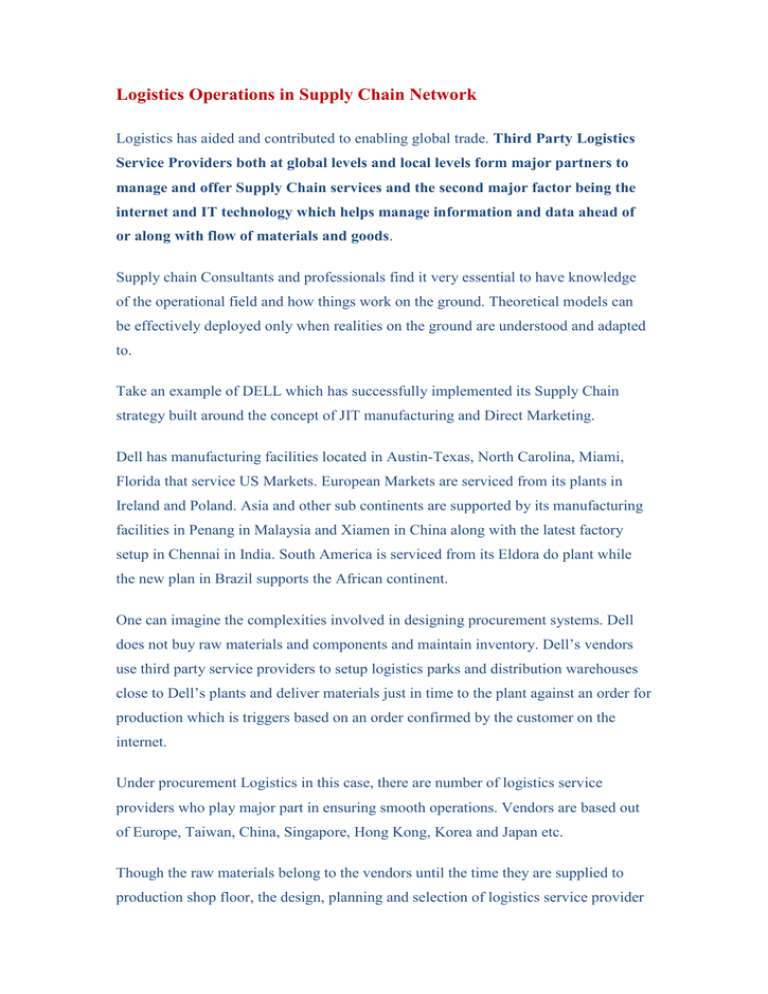Logistics Operations in Supply Chain Network
advertisement

Logistics Operations in Supply Chain Network Logistics has aided and contributed to enabling global trade. Third Party Logistics Service Providers both at global levels and local levels form major partners to manage and offer Supply Chain services and the second major factor being the internet and IT technology which helps manage information and data ahead of or along with flow of materials and goods. Supply chain Consultants and professionals find it very essential to have knowledge of the operational field and how things work on the ground. Theoretical models can be effectively deployed only when realities on the ground are understood and adapted to. Take an example of DELL which has successfully implemented its Supply Chain strategy built around the concept of JIT manufacturing and Direct Marketing. Dell has manufacturing facilities located in Austin-Texas, North Carolina, Miami, Florida that service US Markets. European Markets are serviced from its plants in Ireland and Poland. Asia and other sub continents are supported by its manufacturing facilities in Penang in Malaysia and Xiamen in China along with the latest factory setup in Chennai in India. South America is serviced from its Eldora do plant while the new plan in Brazil supports the African continent. One can imagine the complexities involved in designing procurement systems. Dell does not buy raw materials and components and maintain inventory. Dell’s vendors use third party service providers to setup logistics parks and distribution warehouses close to Dell’s plants and deliver materials just in time to the plant against an order for production which is triggers based on an order confirmed by the customer on the internet. Under procurement Logistics in this case, there are number of logistics service providers who play major part in ensuring smooth operations. Vendors are based out of Europe, Taiwan, China, Singapore, Hong Kong, Korea and Japan etc. Though the raw materials belong to the vendors until the time they are supplied to production shop floor, the design, planning and selection of logistics service provider is initiated and managed by Dell. Dell has appointed freight forwarders such as DHL, CEVA, Panalpina, UPS etc sector wise to pick up shipments from vendor locations, transport the collected shipments by road and consolidate inventories of all vendors in the freight forwarders consolidation warehouses situated at the gate ways in each country and ship out cargo by ships to the port of destination or airfreight shipments to the plant locations after completing exports and customs clearance formalities on behalf of vendors. While the shipments are in transit, the freight forwarders electronically transfer shipment information and documentations to their overseas offices or agents at the destination and keep Dell and vendors informed of the status of shipments. Freight forwarders at the destination ports file advance shipment documents with customs and on arrival of cargo, complete customs formalities and custom cleared cargo is then transported to freight forwarders warehouse or customs bonded warehouse or to another designated third party warehouse which houses all inventories meant for Dell. The third party service provider who manages the inventories in his warehouse receives the cargo, unpacks the shipments from bulk skids to individual carton level and completes inbound formalities including up dating of inventories in its system and stocks the materials in designated rack locations. Both vendors and Dell are continuously kept informed of the data regarding shipments and stocks. The warehouse stocks inventories in the name of various vendors at SKU level. Most of the times these warehouses are situated adjacent to the plant or at close proximity. Upon receiving a production order from Dell, as per Bill of Material received through DELL ERP system, items are picked up, loaded into the supply cages and trays as per pre determined design and delivered to the plant after completing documentation and system entries to remove inventory from its system held in vendors name, invoice raised and physical delivery accompanied with documents completes the supply chain cycle of Raw material supply. The revenue recognition happens when material is transferred out of the warehouse and its system and invoiced to Dell. Source : Management Study Guide






